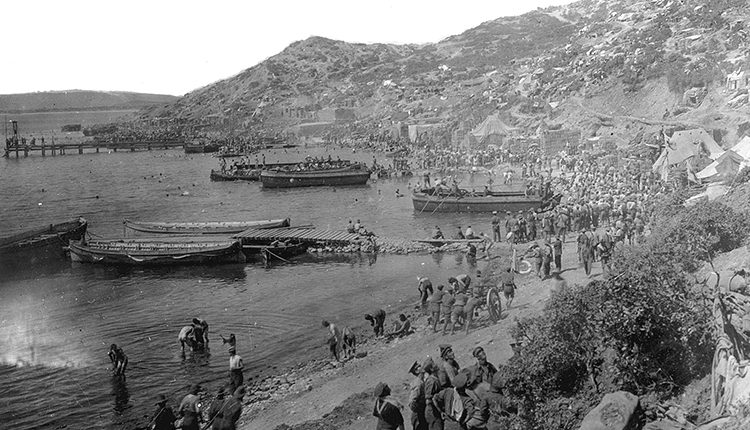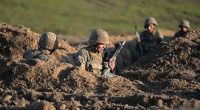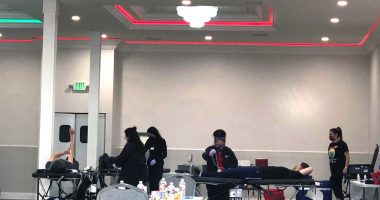BY JIRAIR TUTUNJIAN
Gallipoli Day is a national holiday in Turkey. Thousands of students are bussed (expenses paid by the government) to Gallipoli while travel agencies provide bus tours to the public. Bombastic speeches are made, battle enactments are held, and songs of victory are sung. Countless garish banners and oversized blood-red flags of Turkey flutter across the blood-drenched grounds where 85,000 Ottoman soldiers were killed and 97,000 wounded during the nine-month battle against British, French, Australian, and New Zealand troops in 1914-1915. Turks consider Gallipoli as the defining moment of modern Turkey. The ‘victory’ has also become an ersatz religious event per Erdogan who ascribes the ‘triumph’ to Islam. Turkish historian Kenan Celik mocks Erdogan’s fundamentalist take and says: “They’re telling people ‘We won this by the hands of God.’” Rather than give credit to Germany, Turkey appropriates the victory. Welcome to the Mecca of Turkish religioso nationalists.
[While Turkey identifies its Gallipoli army as Turkish, it conceals the fact that the Gallipoli army was multiethnic with Arabs, Armenians, Greeks, Jews, and Kurds along with Turks. Capt. Sarkis Torossian (1891-1954) was congratulated by Enver Pasha for his bravery at Gallipoli. But Turks, well versed in Armenian Genocide denial, question the existence of Torossian. Shortly after the Gallipoli battle, Turkish troops killed Torossian’s parents.]Although the Turkish ‘victory’ was a farce, it’s understandable why a desperate Turkey saw the need to transform a secondary battle—far away from the main theatres of war—to a crucial event. A country which had lost the overwhelming majority of its wars in the previous two centuries had to elevate Gallipoli to mythic heights.
The German military began to cooperate with the sad sack Ottoman army in the mid-1750s. In the 19th century, one of the greatest European military strategists and theorists Karl Bernhard von Moltke led the upgrading of Ottoman troop training. General Field Marshal Freiherr von der Goltz succeeded von Moltke. But despite German efforts, the Sick Man of Europe kept losing wars to the Russians, Italians, the English, and French and even to the weaker Greeks, Bulgarians, and Serbians.
In 1911 to 1912, the Italians gave a bloody nose to the Ottomans as they took Libya from them. In 1912 to 1913, the Ottomans lost the First Balkan War. In the process they lost 83 percent of their Balkan territories and 60 percent of the ethnic Turkish population.
After Turkish defeat in the First Balkan War, grand vizier Muhammad Sefket Pasha wrote: “I intend to send for a German military mission in the grand scale and, if necessary, I shall even intend to send for a Germany military mission and appoint a German general to command a Turkish army corps, place German staff and regimental officers in command of every unit…and in this way form a model army corps.”
Thus, Gen. Marshal Liman von Sander became the commander of the the Turkish Fifth Army which was responsible for the defense of Gallipoli. Some 500 German officers accompanied him and assigned key functions. The German officers were in charge of laying underwater mines, placing cannons on both shores of the Dardanelles Straits, and training the Ottoman army. The German command and officers played wide-ranging and key roles in the land, sea, and even aerial battles. Howitzer units, 35.5 centimeter guns, mines, anti-submarine barriers, and the batteries were furnished by Germany. Without German leadership, the cannon fodder ‘Turkish’ army would have rolled and gone home.
In his memoirs titled “Five Years in Turkey”, von Sanders wrote about the Turkish defenses before the arrival of the German: “…those military preparations, which the Turkish headquarters had ordered between February 20 and March 1 to meet a successful passage of the allied fleet through the Dardanelles, might have been fatal. Had these [Turkish] orders been carried out, the course of the World War would have been given such a turn in the spring of 1915 that Germany and Austria would have had to continue the struggle without Turkey, because these orders exposed the Dardanelles to a hostile landing!”
One Mustafa Kemal—a lieutenant-colonel—who had just returned from the Libyan War Turkey had lost—somehow became the hero of Gallipoli. In the fifty-five pages devoted to the Gallipoli Battle, von Sanders mentioned Col. Kemal (commander of the 19th Division) several times but far less frequently than he did Jhaved Pasha and Essad Pash. The former was given command of the Gallipoli Peninsula at the end of the campaign.
Meanwhile, von Sanders’ memoirs are replete with Admiral von Usedom, Capt. Pieper, Colonel Wehrle, Captain Nicolai, Captain Wassildo, Captains Prigge, and Muhlmann.
Without taking the credit from the Germans it has to be pointed out that the Allied forces were fated to lose because they had no realistic goals or coherent plan, and carried too many inexperienced troops. Lack of sufficient intelligence data, negligible artillery support, and inadequate logistical and medical arrangements were other challenges.
Why haven’t the Germans exposed the Turkish lie? In the ‘20s Germany continued to be friendly with Turkey and allowed Young Turk genocidiers to live in Germany. In the ‘30s, Germany wouldn’t contradict the Turks because Ataturk was Hitler’s hero. The Nazi dictator admired the Turks for the efficient “deportation” of Armenians. Hitler planned to imitate his idol and “remove” Jews from Europe. After WWII, Turkey and Germany became NATO members and renewed their bond. There are four million Turks in Germany.
Meanwhile, Turks—desperate for military victory—make a bee-line to Gallipoli to celebrate a sham . It takes a special kind of inferiority complex and self-denial to claim another’s victory as your own. People who steal the words of others are called plagiarist. What’s the word for a state which steals the credit of another’s victory? But then again, Turks are past-masters at fabricating falsehood. After all, they discovered America, were the first to explore space, and their languages is the mother of all languages although most Turkish newspapers bear such names as Cumhuriyet, Hurriyet, Sabah, Hayat, Istiklal, and Vatan—all Arabic words.











2 comments
Great article.
There is a Turkish author – I don’t recall his name at the moment – who says that Kemal did not even
take much of a role at Gallipoli and certainly was not the main commander there.
You know the old saying about Gallipoli, “Behind every Turkish soldier there were 8 German soldiers and advisers they (the German soldiers) also were dressed in Turkish uniforms”…